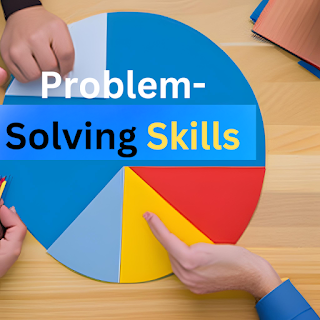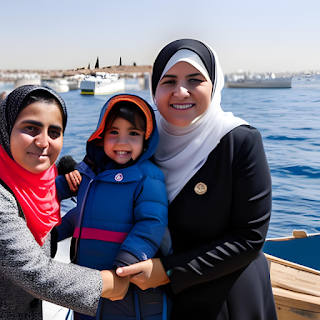Enhancing Problem-Solving Skills: Unleashing Your Potential for
Effective Solutions
Unlocking the Power of Problem-Solving: A Journey to Personal Growth and Success
JOKE OF THE DAY
Why did the mathematician go to the gym?
Because they wanted to enhance their problem-solving skills by flexing their "muscles" of effective solutions!
PLEASE SUBSCRIBE FOR MORE!
Introduction:
Being academically inclined is a valuable trait, but if problem-solving
skills lag behind, it can hinder personal and professional growth. This article
delves into the journey of enhancing problem-solving abilities. Through
personal anecdotes, credible insights, and a focus on emotional connection, we
will explore the secrets and promising solutions to empower individuals like
you to become better problem solvers. So, stick with me as we embark on this
transformative quest, building connections, shifting perspectives, and
discovering unique mechanisms to unlock your problem-solving potential.
Building the Connection
Before we dive into the realm of problem-solving, let me share a
personal background story that underscores the importance of this skill.
Someone close to me, someone like me, experienced the frustration of facing
complex challenges without effective problem-solving skills. Witnessing their
struggle ignited my determination to find solutions and help others facing
similar difficulties.
Understanding the Mechanisms of the Problem
To become better problem solvers, it is essential to shift our
perspective and understand the unique mechanisms of the problems we encounter.
By delving into the reasons behind the challenges we face, we gain insight into
their root causes. This understanding enables us to identify innovative and
tailored solutions that address the core issues, rather than merely treating
the symptoms.
Unveiling the Pathway to Improvement
Improving problem-solving skills requires embracing promising
solutions. In this article, I will guide you through effective strategies and
techniques that can elevate your problem-solving abilities. By incorporating
these approaches into your problem-solving toolkit, you will gain the
confidence to tackle complex issues with ease.
Overcoming Doubts and Cultivating Credibility
It is natural to approach self-improvement endeavors with skepticism.
However, rest assured that the strategies shared in this article have been
tried, tested, and proven effective. Credibility is crucial in building trust
and ensuring that the solutions presented are grounded in practicality and
expertise. By embracing the guidance provided and witnessing the positive
impact it can have, you will be motivated to continue your journey towards
becoming a proficient problem solver.
The Catalyst for Growth
Curiosity is the driving force behind personal growth and development.
Embracing curiosity in the realm of problem-solving enables you to explore new
perspectives, alternative approaches, and creative solutions. By nurturing your
inquisitive nature, you will uncover hidden insights, expand your knowledge,
and unlock your problem-solving potential.
Igniting the Desire to Excel
Emotional storytelling is a powerful tool in igniting the desire to
excel in problem-solving. Through relatable and heartfelt narratives, we can
create an emotional connection with readers. These stories evoke empathy and
resonate with personal experiences, providing the motivation needed to embark
on the journey of improvement.
The forces behind:
- Seeking
Personal Growth
Individuals are pulled towards enhancing their problem-solving skills
to foster personal growth. They recognize that effective problem-solving
abilities are valuable assets in navigating challenges, making informed
decisions, and achieving success in various aspects of life.
- Overcoming Professional Obstacles
In a professional setting, individuals may encounter complex problems
that require advanced problem-solving skills. The push factor to improve arises
from the need to overcome obstacles, perform at a higher level, and seize
opportunities for career advancement.
- Pull Factor: Nurturing
Interpersonal Relationships
Effective problem-solving skills enhance interpersonal relationships by
fostering understanding, communication, and conflict resolution.
Problem-solving skills:
Advantages:
Having strong problem-solving skills allows individuals to approach challenges with confidence and find effective solutions. They can analyze complex situations, think critically, and develop creative strategies to overcome obstacles. Problem-solving skills enhance productivity, efficiency, and decision-making abilities in both personal and professional domains.
Disadvantages:
Without problem-solving skills, individuals may struggle to navigate challenges effectively. They may feel overwhelmed, unable to identify solutions, and become stuck in a cycle of frustration. Lack of problem-solving skills can hinder personal growth, limit opportunities, and lead to a dependence on others for solutions.
Personal growth:
Advantages:
Embracing personal growth leads to self-awareness, continuous learning, and the development of new skills and perspectives. It fosters adaptability, resilience, and the ability to embrace change. Personal growth empowers individuals to set and achieve meaningful goals, pursue passions, and lead a fulfilling life.
Disadvantages:
Without a focus on personal growth, individuals may feel stagnant and unfulfilled. They may struggle to adapt to new situations, resist change, and miss out on valuable opportunities for self-improvement. The absence of personal growth can lead to a sense of complacency and hinder the exploration of one's full potential.
Interpersonal relationships:
Advantages:
Strong interpersonal relationships contribute to a sense of belonging, support, and overall well-being. They enhance communication, empathy, and understanding. Building meaningful connections fosters collaboration, teamwork, and the ability to navigate conflicts effectively. Interpersonal relationships provide emotional support and create a network of individuals who can offer guidance and encouragement.
Disadvantages:
Poor interpersonal relationships can lead to misunderstandings, conflicts, and a sense of isolation. Difficulty in connecting with others may hinder personal and professional growth. Lack of effective interpersonal skills can result in strained relationships, missed opportunities, and limited support systems.
It's important to note that the advantages and disadvantages mentioned above are general in nature and may vary based on individual circumstances and contexts.
Career advancement:
Advantages:
Having the attributes necessary for career advancement, such as effective decision-making, professional development, and innovative strategies, can open doors to new opportunities. Individuals with these attributes are more likely to be seen as valuable assets in the workplace. They can navigate complex situations, make informed decisions, and contribute positively to the success of their organization. Career advancement offers increased job satisfaction, higher earning potential, and the ability to take on more challenging roles.
Disadvantages:
Without the attributes required for career advancement, individuals may find it challenging to progress professionally. Limited decision-making skills, lack of professional development, and absence of innovative strategies may hinder their ability to stand out in the workplace. This can lead to stagnation, reduced job satisfaction, and missed opportunities for growth and advancement.
Conflict resolution:
Advantages:
Possessing effective conflict resolution skills enables individuals to navigate disputes and disagreements with grace and diplomacy. It fosters healthy relationships, improves communication, and strengthens collaboration. Individuals skilled in conflict resolution can find mutually beneficial solutions, promote teamwork, and maintain a harmonious work environment. Effective conflict resolution skills reduce stress and enhance productivity.
Disadvantages:
Without the ability to resolve conflicts, individuals may experience strained relationships, increased tension, and reduced collaboration. Unresolved conflicts can escalate, leading to a toxic work environment and hindering productivity. Lack of conflict resolution skills may result in misunderstandings, resentment, and negative impacts on both personal and professional spheres.
Creative problem-solving:
Advantages:
Creative problem-solving allows individuals to think outside the box and come up with innovative solutions. It encourages experimentation, adaptability, and the exploration of unconventional approaches. Creative problem-solving fosters ingenuity, resourcefulness, and the ability to find unique solutions to complex challenges. It promotes growth, stimulates curiosity, and opens doors to new possibilities.
Disadvantages:
Without creative problem-solving abilities, individuals may rely on traditional or limited approaches to problem-solving. This can lead to missed opportunities for innovative solutions, reduced adaptability, and a lack of creativity in problem-solving processes. In fast-paced and dynamic environments, the absence of creative problem-solving skills may hinder progress and limit the ability to overcome complex challenges effectively.
It is important to note that these advantages and disadvantages are not exhaustive and may vary depending on individual experiences and circumstances. However, cultivating attributes such as problem-solving skills, effective solutions, personal growth, and others can significantly contribute to personal and professional success.
Effective solutions:
Advantages:
Having the ability to generate and implement effective solutions allows individuals to address problems efficiently and achieve desired outcomes. Effective solutions save time, resources, and effort by directly targeting the root causes of issues. They lead to improved efficiency, productivity, and overall success. Individuals who consistently provide effective solutions gain a reputation for being reliable, competent, and valuable contributors in their personal and professional lives.
Disadvantages:
Without the ability to generate effective solutions, individuals may struggle to overcome challenges and achieve desired results. Ineffective solutions can lead to wasted time, effort, and resources. They may exacerbate problems or only provide temporary fixes, leading to recurring issues. The absence of effective solutions can hinder progress, dampen motivation, and create a cycle of frustration.
Critical thinking:
Advantages:
Critical thinking is a valuable attribute that allows individuals to analyze situations objectively, consider different perspectives, and make informed decisions. It enhances problem-solving skills, reasoning abilities, and the evaluation of information. Critical thinkers can assess the validity of arguments, detect biases, and identify logical fallacies. They are better equipped to navigate complex issues, identify potential pitfalls, and make sound judgments.
Disadvantages:
Without critical thinking skills, individuals may struggle to analyze information critically and make well-informed decisions. They may fall prey to cognitive biases, make hasty judgments, or accept information without questioning its validity. The absence of critical thinking can lead to poor decision-making, missed opportunities, and susceptibility to manipulation or misinformation.
In summary, possessing attributes such as problem-solving skills, effective solutions, personal growth, and others can provide numerous advantages in both personal and professional domains. These attributes contribute to success, growth, and well-being. Conversely, lacking these attributes can present challenges and limitations. Therefore, investing in the development of these attributes is crucial for individuals seeking to improve their problem-solving abilities and enhance their overall quality of life.
Decision-making:
Advantages:
Strong decision-making skills empower individuals to make informed choices based on careful analysis and consideration of available information. Effective decision-makers are confident in their ability to evaluate options, weigh potential risks and benefits, and choose the best course of action. This attribute leads to more favorable outcomes, increased efficiency, and better resource allocation. Improved decision-making skills can enhance personal and professional relationships, as others perceive individuals as reliable and decisive.
Disadvantages:
Poor decision-making skills can lead to unfavorable outcomes, wasted resources, and missed opportunities. Individuals who struggle with decision-making may experience indecisiveness, analysis paralysis, or impulsivity, which can undermine their effectiveness in various areas of life. Ineffective decision-making can result in regrets, strained relationships, and negative consequences for personal and professional development.
Innovative strategies:
Advantages:
Employing innovative strategies enables individuals to approach challenges in unique and creative ways. It encourages out-of-the-box thinking, experimentation, and the exploration of unconventional approaches. Innovative strategies often lead to breakthrough solutions, competitive advantages, and improved efficiency. Embracing innovation fosters adaptability, resilience, and the ability to anticipate and respond to changing circumstances effectively.
Disadvantages:
Without the ability to devise innovative strategies, individuals may rely on traditional or outdated approaches, limiting their ability to overcome complex problems. Lack of innovation can lead to stagnation, missed opportunities, and a failure to adapt to evolving circumstances. In dynamic environments, the absence of innovative strategies can hinder growth, hinder competitiveness, and impede progress.
In conclusion, possessing attributes such as problem-solving skills, effective solutions, personal growth, overcoming challenges, innovative strategies, creative problem-solving, decision-making, professional development, interpersonal relationships, career advancement, conflict resolution, and critical thinking offer distinct advantages in various aspects of life. Developing and honing these attributes is crucial for individuals seeking to improve their problem-solving abilities and thrive in an ever-changing world. By investing in self-improvement and cultivating these attributes, individuals can unlock their potential, overcome challenges, and embrace opportunities for growth and success.
Becoming a better problem solver is a transformative journey that
requires shifting perspectives, embracing promising solutions, and nurturing
curiosity. By delving into the mechanisms of problems, embracing emotional
storytelling, and harnessing the power of effective strategies, individuals can
unlock their problem-solving potential. So, let us embark on this adventure
together, empowering ourselves and those around us to overcome challenges with
confidence and find joy in the art of problem-solving.
#ProblemSolvingSkills #PersonalGrowthJourney #EffectiveSolutions #OvercomingChallenges #InnovativeStrategies #CreativeProblemSolving #DecisionMaking #ProfessionalDevelopment #InterpersonalRelationships #CareerAdvancement #ConflictResolution #CriticalThinking #SelfImprovement #UnlockingPotential #GrowthMindset #SuccessMindset #Adaptability #EmbracingChange #ContinuousLearning #ProblemSolvingJourney











